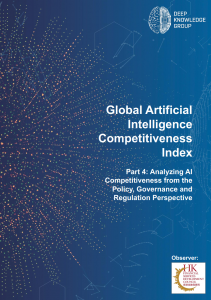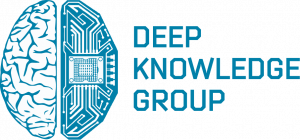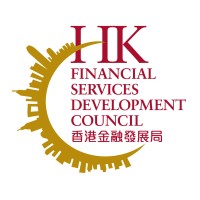Global AI Competitiveness Index Part 4: Governance Gap Widens, EU Sets Regulatory Pace, US and China Lead Implementation
HONG KONG, November 19, 2025 /EINPresswire.com/ -- The global artificial intelligence landscape is undergoing a dramatic governance transformation, with the European Union emerging as the world's regulatory superpower while the United States and China maintain dominance in implementation scale, according to the comprehensive "Global AI Competitiveness Index Part 4: Analyzing AI Competitiveness from the Policy, Governance and Regulation Perspective" released today.
View the report in full here.
Part 4 of the Index produced by the Global AI Competitiveness Index Consortium, and its findings are informed by an astute board of AI Committee Members comprised of renowned AI industry experts selected for their excellence and diversity in domain-specific knowledge and international breadth, including Rudolf Scharping, Rudolf Mellinghoff, Volker Römermann, Christoph Schommer, Jian Zhou, Birgitte Andersen and Xin Zhou, with Deep Knowledge Group serving as Host and primary analytics provider, and Financial Services Development Council (FSDC) sitting as an official Observer Organization.
Part 4 of the Index analyzes the policy and regulatory stances, achievements, and outlooks of roughly 25 key territories setting the standard for AI governance globally, revealing stark disparities in institutional capacity, policy effectiveness, and regulatory maturity as nations race to govern AI technologies that are reshaping global economic and security landscapes.
This new volume represents the most comprehensive mapping yet of the institutional, legislative, and financial mechanisms behind artificial-intelligence governance worldwide. Building upon the previous three editions, which examined enterprise activity, scientific output, and human-capital development, Part 4 moves decisively from innovation to enforcement: from “who builds” to “who governs, funds, and enforces.”
𝐑𝐞𝐠𝐮𝐥𝐚𝐭𝐨𝐫𝐲 𝐃𝐢𝐯𝐞𝐫𝐠𝐞𝐧𝐜𝐞 𝐂𝐫𝐞𝐚𝐭𝐞𝐬 𝐌𝐮𝐥𝐭𝐢-𝐒𝐩𝐞𝐞𝐝 𝐀𝐈 𝐆𝐨𝐯𝐞𝐫𝐧𝐚𝐧𝐜𝐞 𝐖𝐨𝐫𝐥𝐝
The report identifies three distinct governance models emerging globally:
● EU's "Brussels Effect": Comprehensive, rights-based regulation through the AI Act
● US "Innovation-First": Decentralized guidance favoring private sector leadership
● China's "State-Led": Centralized control blending industrial policy with ideological alignment
𝐆𝐨𝐯𝐞𝐫𝐧𝐚𝐧𝐜𝐞 𝐚𝐬 𝐈𝐧𝐝𝐮𝐬𝐭𝐫𝐢𝐚𝐥 𝐒𝐭𝐫𝐚𝐭𝐞𝐠𝐲
The report argues that AI policy is no longer an adjunct to technology strategy but the cornerstone of it. Nations that combine strategic vision with budgets, institutions, and enforcement capacity outperform peers who rely solely on declarations of intent. The index introduces a Governance Readiness Score that correlates institutional maturity with measurable indicators such as AI patent velocity, GDP share from digital industries, and cross-border data-flow openness.
“We have now entered a stage where governance is not a constraint on competitiveness but one of its primary engines,” said Mr Dmitry Kaminskiy, General Partner of Deep Knowledge Group. “The countries that can draft clear national strategies integrated with clear regulatory frameworks will lead not only in research output but in sustainable economic resilience.”
𝐆𝐥𝐨𝐛𝐚𝐥 𝐒𝐭𝐚𝐧𝐝𝐚𝐫𝐝𝐬 𝐑𝐚𝐜𝐞 𝐈𝐧𝐭𝐞𝐧𝐬𝐢𝐟𝐢𝐞𝐬
The EU's regulatory influence extends beyond its borders, with the "Brussels Effect" already visible in Latin America, Southeast Asia, and Africa. Brazil's draft AI framework borrows verbatim from EU definitions, while Singapore's 2024 AI Governance Framework 2.0 was co-authored with the European Commission.
The report devotes a major analytical section to the European Union’s newly enacted AI Act, the world’s first comprehensive risk-tiered regulatory framework for artificial intelligence. It examines the practical challenges of implementation: supervisory division between national agencies, sandbox experimentation by smaller states such as Estonia, and the formation of the European Artificial Intelligence Board. While the EU’s approach positions it as the global standard-setter for trustworthy AI, Dr Patrick Glauner, Professor of AI at Deggendorf Institute of Technology, a co-author of the report and part of the Index’s AI Committee, notes that “compliance costs for small enterprises could dampen innovation unless matched with fiscal incentives and technical assistance, and regulatory protection is not innovation in itself. Europe must demonstrate that "ethical leadership does not become ethical isolation."
𝐅𝐢𝐧𝐚𝐧𝐜𝐞 𝐚𝐬 𝐭𝐡𝐞 𝐍𝐞𝐱𝐭 𝐆𝐨𝐯𝐞𝐫𝐧𝐚𝐧𝐜𝐞 𝐅𝐫𝐨𝐧𝐭𝐢𝐞𝐫
Part 4 emphasizes finance as the most governance-intensive domain for AI deployment. Algorithmic trading, credit scoring, fraud detection, and risk modeling now fall under supervisory regimes that merge fintech and prudential oversight. This was further bolstered by the Financial Services and the Treasury Bureau (FSTB) Policy Statement on the Responsible Application of Artificial Intelligence in the Financial Market, issued in October 2024, which promotes a dual-track approach to balance AI innovation with risk mitigation, seeing AI as a tool that should complement but not replace human judgment. The report highlights Hong Kong’s ecosystem — combining the Financial Services and the Treasury Bureau and the financial regulators — as a case study in proactive “AI-for-Finance” regulation.
Dr King Au, Executive Director of the FSDC, which served as an official observer of the report, noted, “Responsible AI governance is essential to sustaining investor confidence and systemic stability in financial markets. The FSDC is delighted to contribute to a study that elevates Hong Kong’s position as a leading model of accountability and innovation in the global AI landscape.”
𝐀 𝐆𝐥𝐨𝐛𝐚𝐥 𝐃𝐚𝐭𝐚𝐬𝐞𝐭 𝐟𝐨𝐫 𝐚 𝐃𝐞𝐜𝐢𝐬𝐢𝐯𝐞 𝐃𝐞𝐜𝐚𝐝𝐞
The period 2018–2025 has been one of acceleration, but the report looks forward to 2030 and 2035 as the horizon for measurable convergence or divergence. Across the G20, policy harmonization remains partial: the terminology of risk-based regulation has gone global, but execution capacity remains uneven.
The study identifies a tight feedback loop: jurisdictions with clearer governance attract more AI investment, leading to richer tax bases and further institutional reinforcement. Conversely, poorly defined oversight risks brain drain and capital flight, indicating that AI’s future will be decided not by slogans, but by budget lines and supervisory code.
𝐎𝐮𝐭𝐥𝐨𝐨𝐤: 𝐀𝐝𝐚𝐩𝐭𝐢𝐯𝐞 𝐆𝐨𝐯𝐞𝐫𝐧𝐚𝐧𝐜𝐞 𝐚𝐬 𝐂𝐨𝐦𝐩𝐞𝐭𝐢𝐭𝐢𝐯𝐞 𝐀𝐝𝐯𝐚𝐧𝐭𝐚𝐠𝐞
Part 4 concludes with recommendations for governments and regulators: treat AI supervision as critical infrastructure, integrate cross-sectoral coordination units within finance ministries, and formalize knowledge exchange between market regulators, data-protection authorities, and national AI offices. As AI technologies evolve exponentially, the report concludes that "the next decade's winners will be nations that treat AI talent the way earlier eras treated oil or rare-earth metals," while warning that "without sustained investment in technical capacity, diplomatic credibility risks outpacing domestic capability."
View the report in full here.
Part 4 of the Index produced by the Global AI Competitiveness Index Consortium, and its findings are informed by an astute board of AI Committee Members comprised of renowned AI industry experts selected for their excellence and diversity in domain-specific knowledge and international breadth, including Rudolf Scharping, Rudolf Mellinghoff, Volker Römermann, Christoph Schommer, Jian Zhou, Birgitte Andersen and Xin Zhou, with Deep Knowledge Group serving as Host and primary analytics provider, and Financial Services Development Council (FSDC) sitting as an official Observer Organization.
Part 4 of the Index analyzes the policy and regulatory stances, achievements, and outlooks of roughly 25 key territories setting the standard for AI governance globally, revealing stark disparities in institutional capacity, policy effectiveness, and regulatory maturity as nations race to govern AI technologies that are reshaping global economic and security landscapes.
This new volume represents the most comprehensive mapping yet of the institutional, legislative, and financial mechanisms behind artificial-intelligence governance worldwide. Building upon the previous three editions, which examined enterprise activity, scientific output, and human-capital development, Part 4 moves decisively from innovation to enforcement: from “who builds” to “who governs, funds, and enforces.”
𝐑𝐞𝐠𝐮𝐥𝐚𝐭𝐨𝐫𝐲 𝐃𝐢𝐯𝐞𝐫𝐠𝐞𝐧𝐜𝐞 𝐂𝐫𝐞𝐚𝐭𝐞𝐬 𝐌𝐮𝐥𝐭𝐢-𝐒𝐩𝐞𝐞𝐝 𝐀𝐈 𝐆𝐨𝐯𝐞𝐫𝐧𝐚𝐧𝐜𝐞 𝐖𝐨𝐫𝐥𝐝
The report identifies three distinct governance models emerging globally:
● EU's "Brussels Effect": Comprehensive, rights-based regulation through the AI Act
● US "Innovation-First": Decentralized guidance favoring private sector leadership
● China's "State-Led": Centralized control blending industrial policy with ideological alignment
𝐆𝐨𝐯𝐞𝐫𝐧𝐚𝐧𝐜𝐞 𝐚𝐬 𝐈𝐧𝐝𝐮𝐬𝐭𝐫𝐢𝐚𝐥 𝐒𝐭𝐫𝐚𝐭𝐞𝐠𝐲
The report argues that AI policy is no longer an adjunct to technology strategy but the cornerstone of it. Nations that combine strategic vision with budgets, institutions, and enforcement capacity outperform peers who rely solely on declarations of intent. The index introduces a Governance Readiness Score that correlates institutional maturity with measurable indicators such as AI patent velocity, GDP share from digital industries, and cross-border data-flow openness.
“We have now entered a stage where governance is not a constraint on competitiveness but one of its primary engines,” said Mr Dmitry Kaminskiy, General Partner of Deep Knowledge Group. “The countries that can draft clear national strategies integrated with clear regulatory frameworks will lead not only in research output but in sustainable economic resilience.”
𝐆𝐥𝐨𝐛𝐚𝐥 𝐒𝐭𝐚𝐧𝐝𝐚𝐫𝐝𝐬 𝐑𝐚𝐜𝐞 𝐈𝐧𝐭𝐞𝐧𝐬𝐢𝐟𝐢𝐞𝐬
The EU's regulatory influence extends beyond its borders, with the "Brussels Effect" already visible in Latin America, Southeast Asia, and Africa. Brazil's draft AI framework borrows verbatim from EU definitions, while Singapore's 2024 AI Governance Framework 2.0 was co-authored with the European Commission.
The report devotes a major analytical section to the European Union’s newly enacted AI Act, the world’s first comprehensive risk-tiered regulatory framework for artificial intelligence. It examines the practical challenges of implementation: supervisory division between national agencies, sandbox experimentation by smaller states such as Estonia, and the formation of the European Artificial Intelligence Board. While the EU’s approach positions it as the global standard-setter for trustworthy AI, Dr Patrick Glauner, Professor of AI at Deggendorf Institute of Technology, a co-author of the report and part of the Index’s AI Committee, notes that “compliance costs for small enterprises could dampen innovation unless matched with fiscal incentives and technical assistance, and regulatory protection is not innovation in itself. Europe must demonstrate that "ethical leadership does not become ethical isolation."
𝐅𝐢𝐧𝐚𝐧𝐜𝐞 𝐚𝐬 𝐭𝐡𝐞 𝐍𝐞𝐱𝐭 𝐆𝐨𝐯𝐞𝐫𝐧𝐚𝐧𝐜𝐞 𝐅𝐫𝐨𝐧𝐭𝐢𝐞𝐫
Part 4 emphasizes finance as the most governance-intensive domain for AI deployment. Algorithmic trading, credit scoring, fraud detection, and risk modeling now fall under supervisory regimes that merge fintech and prudential oversight. This was further bolstered by the Financial Services and the Treasury Bureau (FSTB) Policy Statement on the Responsible Application of Artificial Intelligence in the Financial Market, issued in October 2024, which promotes a dual-track approach to balance AI innovation with risk mitigation, seeing AI as a tool that should complement but not replace human judgment. The report highlights Hong Kong’s ecosystem — combining the Financial Services and the Treasury Bureau and the financial regulators — as a case study in proactive “AI-for-Finance” regulation.
Dr King Au, Executive Director of the FSDC, which served as an official observer of the report, noted, “Responsible AI governance is essential to sustaining investor confidence and systemic stability in financial markets. The FSDC is delighted to contribute to a study that elevates Hong Kong’s position as a leading model of accountability and innovation in the global AI landscape.”
𝐀 𝐆𝐥𝐨𝐛𝐚𝐥 𝐃𝐚𝐭𝐚𝐬𝐞𝐭 𝐟𝐨𝐫 𝐚 𝐃𝐞𝐜𝐢𝐬𝐢𝐯𝐞 𝐃𝐞𝐜𝐚𝐝𝐞
The period 2018–2025 has been one of acceleration, but the report looks forward to 2030 and 2035 as the horizon for measurable convergence or divergence. Across the G20, policy harmonization remains partial: the terminology of risk-based regulation has gone global, but execution capacity remains uneven.
The study identifies a tight feedback loop: jurisdictions with clearer governance attract more AI investment, leading to richer tax bases and further institutional reinforcement. Conversely, poorly defined oversight risks brain drain and capital flight, indicating that AI’s future will be decided not by slogans, but by budget lines and supervisory code.
𝐎𝐮𝐭𝐥𝐨𝐨𝐤: 𝐀𝐝𝐚𝐩𝐭𝐢𝐯𝐞 𝐆𝐨𝐯𝐞𝐫𝐧𝐚𝐧𝐜𝐞 𝐚𝐬 𝐂𝐨𝐦𝐩𝐞𝐭𝐢𝐭𝐢𝐯𝐞 𝐀𝐝𝐯𝐚𝐧𝐭𝐚𝐠𝐞
Part 4 concludes with recommendations for governments and regulators: treat AI supervision as critical infrastructure, integrate cross-sectoral coordination units within finance ministries, and formalize knowledge exchange between market regulators, data-protection authorities, and national AI offices. As AI technologies evolve exponentially, the report concludes that "the next decade's winners will be nations that treat AI talent the way earlier eras treated oil or rare-earth metals," while warning that "without sustained investment in technical capacity, diplomatic credibility risks outpacing domestic capability."
Iain Inkster
Deep Knowledge Analytics Limited
+44 7471 555731
email us here
Legal Disclaimer:
EIN Presswire provides this news content "as is" without warranty of any kind. We do not accept any responsibility or liability for the accuracy, content, images, videos, licenses, completeness, legality, or reliability of the information contained in this article. If you have any complaints or copyright issues related to this article, kindly contact the author above.



